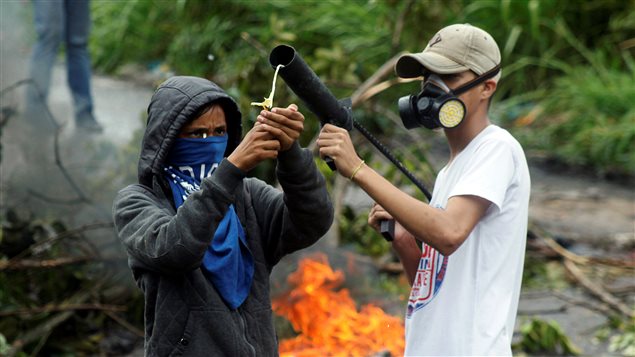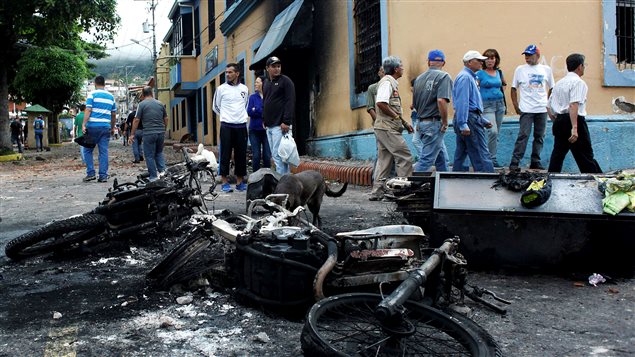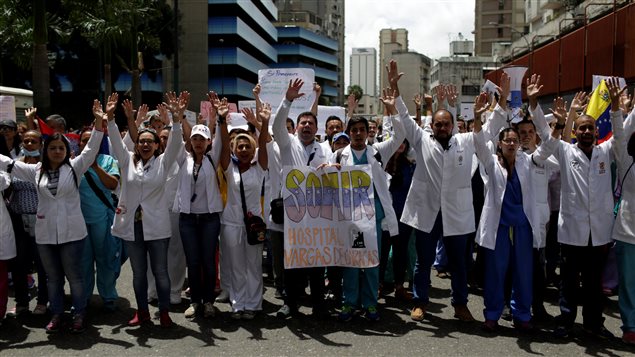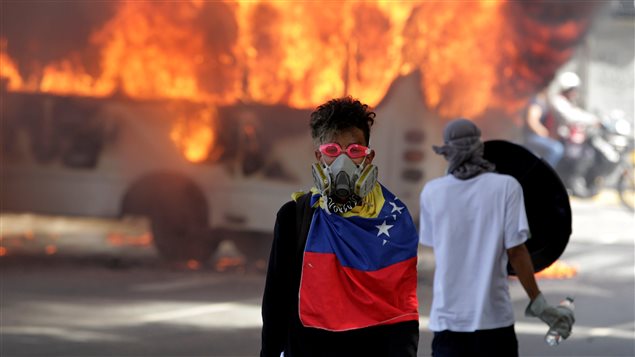A Canadian coalition of labour groups and civil society activists is calling on the federal government to rethink its policy towards the deepening crisis in Venezuela and stop supporting radical elements of the opposition who have vowed to overthrow the Socialist government of President Nicolas Maduro.
Raul Burbano, the program director of Common Frontiers, a left-wing umbrella group that opposes the neo-liberal model of economic development and integration in the Americas, says Canada needs to play a more even-handed role in trying to resolve the political impasse in Venezuela.
“Canada has predominantly talked a lot about human rights, labour rights on the global scale and that’s the way it sort of presents itself,” said Burbano. “Unfortunately, the reality we see in Latin America – it could be Venezuela, Colombia, Honduras – Canada has been pretty much preoccupied with its economic interests, much of that extractive industries.”
‘Incoherent policy’
In challenging Venezuela’s democracy Ottawa has aligned herself with governments of Colombia, Mexico and Honduras who within the Organization of American States are leading the charge against the Socialist government of President Maduro, said Burbano.
Canada’s policy is not coherent when Ottawa is pushing for human rights in Venezuela but ignores human rights abuses committed by right-wing governments in Colombia, Mexico Honduras, Burbano said.
“I think the government of Canada should make clear its support for constitutional government, electoral democracy and rule of law in Venezuela, and support mediation by organizations that are neutral, for example, the Union of South American States (UNASUR), and, of course, the representatives of the Vatican that are part of the process there,” Burbano said.
(click to listen to the full interview with Raul Burbano)
ListenChavez legacy in trouble

Since the election of Hugo Chavez in 1999, Venezuela has achieved impressive gains in health care, education, and reduction in poverty, while at the same time wrestled economic and political control from the country’s elite, said Burbano.
“These gains have come at a cost to local elites, which means they’ve lost power, revenue from oil in Venezuela has gone towards social programs as opposed to necessarily corporate profits and I think this has created an element of contradictions of power within Venezuela,” Burbano said.
Venezuela has also sought greater integration among Latin American countries but outside the Organization of American States (OAS), a regional organization supported both by the United States and Canada, Burbano said.
Today, soaring inflation, a shrinking economy and a hyper-politicized environment are contributing to unprecedented challenges economically and politically and are threatening to undo some of the achievements of the past, Burbano wrote in a recent analysis piece entitled Venezuela: a Threat to US Energy Hegemony?
“Obviously the government has a lot to take responsibility for but to lay all the brunt of those issues on the shoulders of the government would be disingenuous because there is a lot of factors that are at play here,” Burbano said. “In Venezuela, we have an opposition that doesn’t play the traditional role that we would think of in Canada or other countries, of an opposition that is actually trying to challenge the government in a political, democratic way to better the situation but rather is trying to destabilize the government and the economic situation.”
Biased coverage

These challenges can be attributed to many factors, some structural, such as an oil-dependent economy, and a complex monetary arrangement which has given rise to “bachaqueros,” black market operatives, who resell price-controlled items at hugely inflated prices on the black market, Burbano said.
Burbano is also critical of mainstream international media for what he calls its biased coverage of the conflict in Venezuela. Mainstream media outlets have failed to adequately report on violent actions against government supporters by extremist sectors of the opposition, he said. Instead, they have diligently perpetuated the opposition narrative that the crisis in Venezuela is the sole responsibility of the Maduro government, a dictatorship on the brink of collapse resorting to violence against peaceful protesters in a desperate bid to hold on to power, Burbano said.
The reality is that despite widespread street protests, the government enjoys the support of about two-thirds of the population, according to independent opinion polls, Burbano said.

The hardline opposition inspired street protests have intensified in violence over the past few weeks, including deadly street barricades, violent clashes with state security forces, attacks against government supporters, the setting of government food-storage building on fire with Molotov cocktails, as well as an attack on a maternity hospital in the El Valle neighbourhood, Burbano said. Of the 42 people that have been killed in the unrest since the beginning of April, eight people were electrocuted during a looting incident, five people were killed by state security forces, and fifteen people have died directly or indirectly as a result of the actions of opposition protesters and the rest are still unaccounted for, Burbano said.
This comes on top of the murder of two government workers shot dead by sniper fire while participating in pro-government rallies, and the assassination of labour leader, Rexol Alexander Acevedo Navas, a member of United Socialist Party of Venezuela, Burbano said.
Participatory democracy
Venezuela has one of the strongest and most active democracies in the region having carried out 20 elections in 17 years (presidential, regional, municipal and referenda), Burbano argued. It has a strong direct democracy that empowers grassroots groups through communes and communal councils, he said.
In January 2016, the opposition-controlled National Assembly was held in contempt of the constitution by the Supreme Court of Justice over fraud charges involving opposition deputies from the state of Amazonas who were recorded illegally offering payment for votes. When the Supreme Court ordered the National Assembly to hold elections to replace the corrupt deputies, the legislative ignored the order and refused to remedy the situation, Burbano said.
“In essence, the National Assembly today is in violation of the constitution,” Burbano said. “There is definitely a power struggle and we see an opposition that is not following the rules of the constitution and I think that’s what’s creating a big challenge.”
Constitutional changes
In a bid to address the country’s political standoff, Maduro is calling for a National Constituent Assembly which will be responsible for re-drafting the 1999 constitution, written by Chavez. The assembly will be composed of 500 directly elected delegates, half of which will be elected from among the country’s social movements, Burbano said.
Opposition leaders have criticized the initiative, accusing the president of trying to outmanoeuvre them in the legislature and postpone elections. Despite the staunch criticism, the opposition had in the past advocated for a Constituent Assembly as a solution to resolve the country’s problems, Burbano said.
The majority of people in Venezuela want to move forward in a peaceful manner to resolve their differences while demanding respect for their sovereignty, Burbano said.







For reasons beyond our control, and for an undetermined period of time, our comment section is now closed. However, our social networks remain open to your contributions.